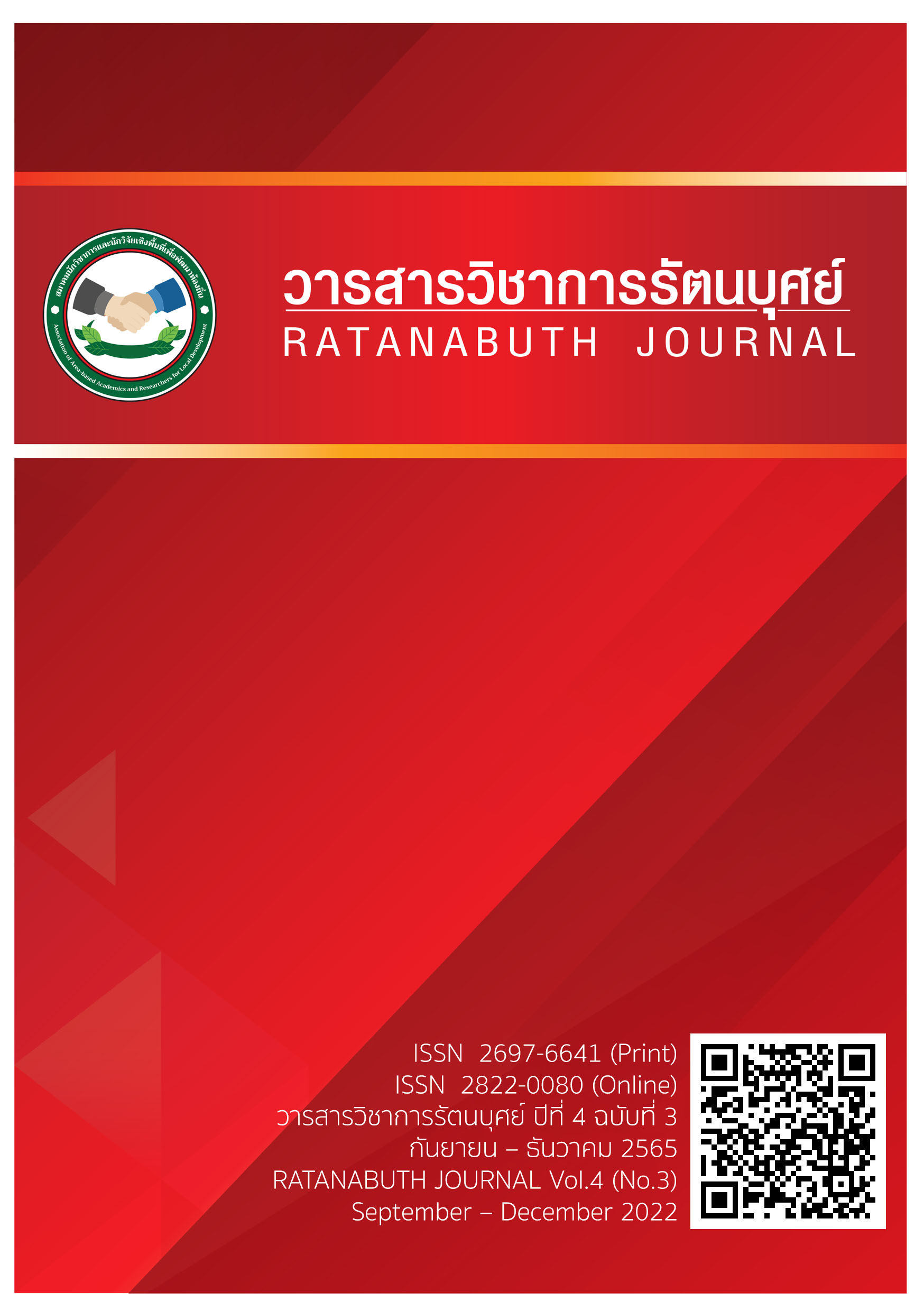Buddhist Way of Creating “Boworn” Power for Peace in Thai Society
Main Article Content
Abstract
Ban, Wat, School called “Boworn” is the main organization or central unit responsible for connecting relationships, developing, making decisions, and solving problems. Palang Bowon is a source of morality, concepts, ways of thinking and values for people living together with generosity and support and leading to local reconciliation. As a result, the main foundation of “Boworn” leading to reconciliation to create peace in society has to possess 9 elements including 1) leaders, 2) morality and ethics, 3) public mind or volunteerism, 4) participation or exchange of learning together, 5) integration of multiple intelligence, 6) sufficiency economy, 7) good governance, 8) integration of creativity with local wisdom, and 9) information technology or digital learning media.
Article Details

This work is licensed under a Creative Commons Attribution-NonCommercial-NoDerivatives 4.0 International License.
References
กันยารัตน์ แย้มศรีแก้ว. (2558). การบริหารจัดการความร่วมมือของ บ้าน วัด โรงเรียน. วิทยานิพนธ์ปริญญาดุษฎีบัณฑิต สาขาการบริหารการศึกษา มหาวิทยาลัยศิลปากร.
คมสันติ์ จันทร์อ่อน. (2564). บวร: บ้าน, วัด, โรงเรียน สังคมแห่งการเกื้อกูล. สืบค้นเมื่อ 17 ธันวาคม 2564 จาก: http://prachatai.org/journal/2015/12/62826.
นพวรรณ พงษ์เจริญ. (2564). กระบวนการประชาสังคม บ้าน วัด โรงเรียน “บวร”. สืบค้นเมื่อ 17 ธันวาคม 2564 จาก:https://www.gotoknow.org/posts/365266.
ธนพรรณ ธานี. (2545). การศึกษาชุมชน.ขอนแก่น : ภาควิชาพัฒนาสังคม คณะมนุษยศาสตร์และสังคมศาสตร์มหาวิทยาลัยขอนแก่น.
พระไพศาล วิสาโล. (2550). ศาสตร์และศิลป์แห่งการจัดการความดี ศึกษากรณีมูลนิธิพุทธฉือจี้. กรุงเทพมหานคร : พริกหวานกราฟฟิค จํากัด.
พระเทพเวที (ประยุทธ์ปยุตฺโต). (2532). พุทธธรรม. พิมพ์ครั้งที่ 5. กรุงเทพมหานคร: มหาจุฬาลงกรณราช วิทยาลัย.
พระธรรมปิฎก (ป.อ. ปยุตฺโต). (2541). การศึกษา : เครื่องมือพัฒนาที่ยังต้องพัฒนา (พิมพ์ครั้งที่ 2). กรุงเทพฯ : มูลนิธิพุทธธรรม.
พระธรรมปิฏก (ป.อ. ปยุตฺโต). (2543). ธรรมนูญชีวิต: พุทธจริยธรรมเพื่อชีวิตที่ดีงาม. กรุงเทพมหานคร: มูลนิธิพุทธธรรม.
ภูวณัฐสร์ หนูมาก. (2549). กระบวนการมีส่วนร่วมของบ้าน วัด โรงเรียน (บวร) ต่อการพัฒนาโรงเรียนวิถีพุทธ. วิทยานิพนธ์สังคมสงเคราะห์ศาสตรมหาบัณฑิต สาขาการบริหารและนโยบายสวัสดิการสังคม. บัณฑิตวิทยาลัย. มหาวิทยาลัยธรรมศาสตร์.
เรวัฒน์ แก้วเก่า, มณฑา จำปาเหลือง. (2557). ความสัมพันธ์ระหว่างการดำเนินกิจกรรมตามบทบาทหน้าที่ของบ้าน วัด โรงเรียน กับคุณลักษณะผู้เรียนตามหลักไตรสิกขาของสถานศึกษาสังกัดสำนักงานเขตพื้นที่การศึกษาประถมศึกษา เพชรบุรี เขต 1. วารสารวิชาการ Veridian E-Journal. 7 (2), 826-839.
วินิจ ผาเจริญ. (2020). การมีส่วนร่วมของชาวบ้านในการอนุรักษ์ฟื้นฟูป่าต้นน้ำอย่างยั่งยืนตามแนว พระราชดำริ กรณีศึกษา บ้านป่าสักงาม ตำบลลวงเหนือ อำเภอดอยสะเก็ด จังหวัดเชียงใหม่. วารสารวิชาการธรรมทรรศน์, 20 (2),113-126.
อริยา พรหมสุภา. (2559). "บวร" บ้าน วัด โรงเรียน องค์กรแห่งการเรียนรู้ในชุมชน : ชุมชนโป่งคา จังหวัดน่าน และชุมชนแจ่มหลวง จังหวัดเชียงใหม่. กองแผนงานมหาวิทยาลัย เทคโนโลยีพระจอมเกล้าธนบุรี.
Jaiyakiew, A. (2012). The practical applications of the philosophy of self-sufficiency economy in schools under Elementary Education Office Chiang Rai, District 3: Bansankong School case study in Mae Chan. Chiang Rai (Master thesis). Mae Fah Luang University.
Inthapanyo (Seela), P. Huadsri, C. & Promgun, S. (2021). Principles of Good Governance Affecting Local Governance in Kantharawichai District, Mahasarakham Province. School of Administrative Studies Academic Journal. 4 (2), 31-44.
Pengjan, S. (2020). Public Participation regarding Community Rights in Natural Resources on Koh Klang Bang Talu,Surat Thani Province. School of Administrative Studies Academic Journal. 3 (3), 1-18.
PhramahaTanongsak Teerasakko (Tadee). (2020). The Right Livelihood in Theravada Buddhist Philosophy. School of Administrative Studies Academic Journal. 4 (2), 84-94.
Sangsod, S. & Manus Suwan,M. (2020). Strategy for Strengthening Northern Communities,Using Community Economy Based. School of Administrative Studies Academic Journal. 3 (2), 40-56.
Sirisugandha, T. (2020). Participation in creating value of the elderly through economic wisdom knowledge management in School for the Elderly, Napong sub-district, Thoen district,Lampang Province. School of Administrative Studies Academic Journal. 3 (3), 1-18.
Sukthawee, K. Phengphan,W. Kosaiyawat, S. & Promsuwicha,S.,(2020). The Guidelines on Volunteer Spirit Networks to Promote the Life Skills for Good Relations Building with Others of Senior High School Students in Nakhon Nayok Province. School of Administrative Studies Academic Journal. 3 (4), 66-82.
Techatanminasakul, S. (2020). The Guidelines to create social capital and social reconciliation in Thailand. School of Administrative Studies Academic Journal. 3 (2), 40-56.
Vanichwatanavorachai, S. & Homfung, C. (2020). The Creative Integration of Local Wisdom into Teaching and Learning in the 21st Century. Veridian E-Journal, Silpakorn University. 11 (3),2551-2563.
Vathakaew, P. & Kaewketpong,P. (2020). Model of leadership according to Buddhism. School of Administrative Studies Academic Journal. 3 (3), 94-106.


